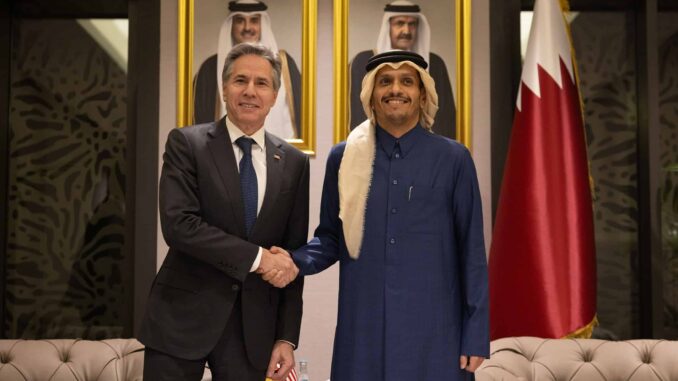Experts told JNS that it’s a ‘sick joke’ that the Gulf emirate is hailed as a serious hostage mediator between Israel and Hamas.
By Andrew Bernard, JNS 22 February 2024
 U.S. Secretary of State Antony Blinken holds a joint press availability with Qatari Prime Minister and Foreign Minister Mohammed bin Abdulrahman Al Thani in Doha, Qatar, on Jan. 7, 2024. Credit: Chuck Kennedy/U.S. State Department.
U.S. Secretary of State Antony Blinken holds a joint press availability with Qatari Prime Minister and Foreign Minister Mohammed bin Abdulrahman Al Thani in Doha, Qatar, on Jan. 7, 2024. Credit: Chuck Kennedy/U.S. State Department.
Much of the hope for securing the release of the 134 remaining hostages whom Hamas kidnapped to Gaza—32 confirmed dead and another 20 feared dead—on Oct. 7 lies some 1,300 miles away, in the tiny Gulf emirate of Qatar.
On a nearly daily basis, the Biden administration lauds Qatari “mediation” with Hamas, whose political leaders the Gulf nation hosts in Doha.
“This is a negotiation process that has been also led by Qatar and also Egypt—those leaderships there,” Karine Jean-Pierre, White House press secretary, said on Feb. 6.
On the same day, U.S. Secretary of State Antony Blinken said at a press conference in Doha with Mohammed bin Abdulrahman Al Thani, the Qatari prime minister and minister of foreign affairs, that “we’re very fortunate to have Qatar as a partner.”
But Qatar is not a disinterested mediator. Qatari officials routinely take positions on the negotiations themselves, as Al Thani did at the Munich Security Conference this weekend when he said that Israel should agree to an unconditional ceasefire without the release of hostages.
“Unfortunately, this is being misused by a lot of countries—that in order to get a ceasefire, it’s conditional to have the hostage deal,” the Qatari leader said. “It shouldn’t be conditional. What’s conditional is the humanitarian catastrophe over there in Gaza.”
Experts questioned whether Qatar can maintain these positions, which echo Hamas’s demands, and remain a privileged U.S. ally.
“The very notion that Qatar could still be trying to manage this hostage channel, while simultaneously advocating for an end of the war that preserves its terrorist client in Gaza, says quite a lot about the regime’s role in this war,” Jonathan Schanzer, senior vice president for research at the Foundation for Defense of Democracies, told JNS. “It’s a sick joke.”
‘They’re in a tricky situation’
Qatar has emphasized in its statements that it shouldn’t be blamed for hosting Hamas’s politburo or for funding Hamas in the Gaza Strip because it claims that those decisions were made at the request of or in coordination with Washington and Jerusalem.
Hussein Ibish, a senior resident scholar at the Arab Gulf States Institute in Washington, told JNS that he believes that Qatar knows that its relationship with Hamas is now untenable.
“The Qataris are aware they’re in a tricky situation,” Ibish said. “They’re trying to figure out how to change their policies sufficiently to avoid a real problem with the United States.”
“The Qataris are sincerely looking for formulae to effectively show most of the Hamas leaders in Qatar the door,” he said. “In a way that would be effective and not that damaging to them in terms of their reputation among their populist constituencies like Islamists and pan-Arab nationalists that they have been cultivating through Al Jazeera Arabic, other Arab media and their own foreign policy for the past 20 to 25 years.”
The Biden administration designated Qatar a “major non-NATO ally” in 2022, placing it alongside countries like Japan and Australia, which are among the closest U.S. defense partners.
In making the announcement, the Biden administration cited Qatar’s role in mediating the U.S. withdrawal from Afghanistan, and in January the United States renewed a 10-year deal for Qatar to host U.S. troops at Al Udeid Air Base.
 U.S. Secretary of State Antony Blinken with Qatari Prime Minister and Foreign Minister Mohammed bin Abdulrahman Al Thani in Doha, Qatar on Feb. 6, 2024. Credit: Chuck Kennedy/U.S. State Department.
U.S. Secretary of State Antony Blinken with Qatari Prime Minister and Foreign Minister Mohammed bin Abdulrahman Al Thani in Doha, Qatar on Feb. 6, 2024. Credit: Chuck Kennedy/U.S. State Department.
Michael Pregent, a senior fellow at the Hudson Institute who has called for ending the U.S.-Qatar alliance, told JNS that Bahrain or the United Arab Emirates could replace Qatar in hosting a U.S. military base.
“We’re not dependent on Qatar. We chose to be,” Pregent said. “Hosting a U.S. base should not give an ally an advantage, should not give an ally leverage. It definitely shouldn’t give Hamas leverage and Tehran leverage.”
While Washington continues to praise Qatar publicly for mediating in the negotiations with Hamas, Israeli Prime Minister Benjamin Netanyahu has increasingly criticized its role.
“Qatar can press Hamas as no one else can. They host Hamas leaders. Hamas is dependent on them financially,” Netanyahu said in an address to the Conference of Presidents of Major American Jewish Organizations meeting in Jerusalem on Sunday.
Pregent said that the failure to reach a hostage deal has revealed the notion of Qatari influence on Hamas to be a myth.
“You’ve seen the PR charm offensive they’ve been on ever since Oct. 7, and this has exposed that they have no influence over Hamas,” Pregent said. “Their role there is to negotiate the best possible position for Hamas. They are exposing the fact that they are not an ally in this. They are basically Hamas’s divorce lawyer.”
‘Washington asked for it’
Simon Henderson, Baker fellow and director of the Bernstein Program on Gulf and Energy Policy at Washington Institute for Near East Policy, told JNS that the U.S. relationship with Qatar will continue as long as the Biden administration finds it useful in the hostage negotiations.
“Hosting Hamas was done because Washington asked for it,” Henderson said. “It has continued because Washington has continued to make use of it.”
Still, Washington is frustrated at the moment that there appears to be no workable alternative to Qatar, according to Henderson.
“Is anybody proposing something else? It depends to an extent on what your concern is,” he said. “If your concern is to destroy Hamas, you don’t need Qatar. If your concern is to try to save as many hostages as you can, as far as I can make out, you do need Qatar.”



The US really doesn’t have any allies per say. I have labelled them as “allies.” I think this is an apt description. Perhaps Israel is an ally but as crappy as the US has often treated Israel over the decades I’m sure the Israelis know full well not to trust our government in pretty much anything and plan accordingly.
This applies to NATO “allies” as well. Essentially these are group of users, abusers, and grifters who are parasites feeding on America and our people. This includes countries like the UK,